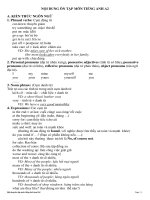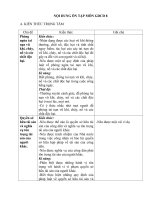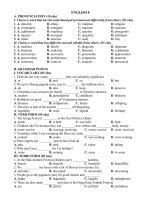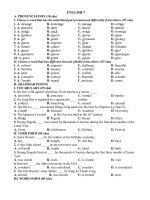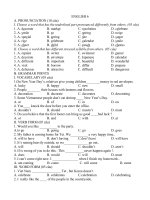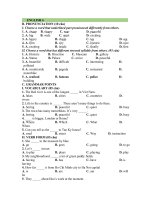Nội dung ôn tập Tiếng Anh 8 - Tuần 5 (3)
Bạn đang xem bản rút gọn của tài liệu. Xem và tải ngay bản đầy đủ của tài liệu tại đây (106.57 KB, 18 trang )
<span class='text_page_counter'>(1)</span><div class='page_container' data-page=1>
<b>School: Kim Son Secondary School</b>
<b>Teacher: Le Thi Hieu</b>
<b>Week: 05</b>
<b>TEST FOR UNIT 7</b>
<b>I. Choose the word whose underlined part is pronounced differently from the others.</b>
<b>1. A. disease</b> <b>B. dead</b> <b>C. treatment</b> <b>D. sneeze</b>
<b>2. A. environment</b> <b>B. billboard</b> <b>C. visual </b> <b>D. litter</b>
<b>3. A. birth</b> <b>B. thermal</b> <b>C. earth</b> <b>D. further</b>
<b>4. A. poisoned</b> <b>B. died</b> <b>C. dumped</b> <b>D. caused</b>
<b>5. A. contaminant</b> <b>B. waste</b> <b>C. illustrate </b> <b>D. radiation</b>
<b>II. Choose the word whose main stress pattern is placed differently.</b>
<b>1. A. environment</b> <b>B. temperature</b> <b>C. botanical</b> <b>D. contaminant</b>
<b>2. A. untreated</b> <b>B. aquatic</b> <b>C. pollution</b> <b>D. electronic</b>
<b>3. A. pollute</b> <b>B. poison</b> <b>C. damage</b> <b>D. illustrate </b>
<b>4. A. presentation</b> <b>B. radioactive</b> <b>C. environmental D. contamination</b>
<b>5. A. permanent</b> <b>B. Chemical</b> <b>C. dramatic</b> <b>D. herbicide</b>
<b>III. Complete each sentence with an appropriate word. The first letter of each word is </b>
<b>given.</b>
<b>1. The fish have died because the river water is heavily p________.</b>
</div>
<span class='text_page_counter'>(2)</span><div class='page_container' data-page=2>
<b>3. Acid rain causes serious d________ to plants and trees.</b>
<b>4. If the air wasn’t dirty, Nick w________ sneeze so much.</b>
<b>5. The main gases that l________ to acid rain are sulfur dioxide and nitrogen dioxide.</b>
<b>6. There is a danger of serious contamination from radioactive w________.</b>
<b>7. Hundreds of d________ fish were found floating in the river near the factory.</b>
<b>8. U________ sewage can spread disease and contaminate drinking water sources.</b>
<b>IV. Choose the best answer A, B, C or D to complete the sentence.</b>
1. After the accident, many people were exposed________ radiation.
<b>A. from</b> <b>B. at</b> <b>C. to</b> <b>D. with</b>
2. Light pollution has a wide range of negative effects________ I’m human health.
<b>A. on</b> <b>B. of</b> <b>C. for</b> <b>D. to</b>
3. ________can cause high blood pressure, heart problems, sleep disturbances, and hearing
problems.
<b>A. Air pollution B. Light pollution C. Water pollution </b> <b>D. Noise pollution</b>
4. The levels of carbon dioxide in the atmosphere have risen________ the burning of fossil
fuels.
<b>A. therefore</b> <b>B. because</b> <b>C. in spite of</b> <b>D. due to</b>
5. If rubbish is non-biodegradable, it________ forever.
<b>A. exists</b> <b>B. will exist</b> <b>C. won’t exist</b> <b>D. doesn’t exist</b>
6. ________are Chemicals that are used to kill unwanted plants, such as weeds.
<b>A. Fertilizers</b> <b>B. Pesticides</b> <b>C. Herbicides</b> <b>D. Pollutants</b>
7. There would be much less pollution________ people stopped using cars completely.
</div>
<span class='text_page_counter'>(3)</span><div class='page_container' data-page=3>
8. Emissions of pollutants into the air can________ changes to the climate.
<b>A. get on</b> <b>B. end up</b> <b>C. go into</b> <b>D. result in</b>
9. ________can we help save our environment?
<b>A. What</b> <b>B. How</b> <b>C. Why</b> <b>D. How much</b>
10. If we care about plastic waste________.
<b>A. why won’t we stop drinking bottled water? </b> <b>B. we would use reusable shopping bags</b>
<b>C. we will throw away plastic water bottles. </b> <b>D. why don’t we buy plastic bags?</b>
<b>V. Choose the underlined word or phrase, A, B, c or D that needs correcting.</b>
1. What will happen if the Earth stopped moving?
<b> A B C D</b>
2. One of the things all of us can do to protect and improve our environment is recycle.
<b> A B C D</b>
3. Humans can even die if they will drink contaminated water.
<b> A B C D</b>
4. Long-term exposure to loud noise results permanent hearing loss.
<b> A B C D</b>
5. They believe that water pollution is the large cause of death and disease in the world.
<b> A B C D</b>
6. Is the recycling process in itself damaging for the environment?
<b> A B C D</b>
</div>
<span class='text_page_counter'>(4)</span><div class='page_container' data-page=4>
8. One in six species is at risk of extinction because climate change.
<b> A B C D</b>
9. The amount of waste decreased if people started to buy reusable packages.
<b> A B C D</b>
10. Contaminated water can cause of many types of diarrheal diseases, including cholera.
<b> A B C D</b>
<b>VI. Write the correct tense or form of the verbs in brackets.</b>
<b>1. It would be better for the environment if more people________ (use) bikes rather than </b>
cars.
<b> 2. If we use less energy, we________ (help) reduce greenhouse gas emissions.</b>
<b>3. Every year, million tons of plastic________ (dump) into the oceans.</b>
<b>4. A thick smog________ (settle) over New Delhi since winter________ (begin).</b>
<b>5. Noise pollution can________ (cause) by vehicle, aircraft, and industrial noise.</b>
<b>6. Human activities________ (destroy) nature at an unacceptable rate right now.</b>
<b>7. A decade ago, WHO________ (classify) air pollution as a link to lung cancer.</b>
<b>8. If the temperature________ (increase) by a few degrees during the next few years, </b>
<b>we________ (run into) serious problems.</b>
<b>9. What________ (happen) if all the pollution in the world________ (disappear)?</b>
<b>10. At 8 o’clock last night, I________ (watch) “A Plastic Wave”, a documentary on plastic </b>
pollution.
</div>
<span class='text_page_counter'>(5)</span><div class='page_container' data-page=5>
<b>VII. Supply the correct form of the words in brackets.</b>
<b>1. As an________ why do you oppose banning plastic bags? (environment)</b>
<b>2. The radiation leak has had a________ effect on the environment. (disaster)</b>
<b>3. The water supply is being tested for________. (contaminate)</b>
<b>4. Heavy metals in________ water cut short millions of lives every year. (drink)</b>
<b>5. Scientists warn that plastic pollution in oceans will be one of the ________ threats. (big)</b>
<b>6. Pollution is the process of making parts of the living environment________. (dirt)</b>
7. If thermal pollution continues for a long time, it can________ cause huge bacteria.
<b>(possible)</b>
<b>8. She became deaf after long-term________ to noise in the workplace. (expose)</b>
<b>9. Living near a busy road could cause high blood________. (press)</b>
<b>10. Wastewater________ a process used to remove contaminants from sewage. (treat)</b>
<b>VIII. Match the questions to the answers.</b>
1. What is the main reason for thermal
pollution?
2. What effect does thermal pollution
have on aquatic animals?
3. How to minimize the water pollution
due to Chemicals?
4. What diseases are usually caused by
air pollution?
5. Which gas is mainly responsible for
global warming?
6. What are the effects of noise
a. They are non-biodegradable and create an
environmental harzard.
b. Nuclear wastes from nuclear power plants,
mining and processing of nuclear material etc.
c. Carbon dioxide. It contributes about 55% to
global warming.
d. It affects their growth and may kill off them.
e. Hot water released by power plants and
industries.
</div>
<span class='text_page_counter'>(6)</span><div class='page_container' data-page=6>
pollution?
7. Why are plastic bags a big
environmental nuisance?
8. What are sources of radioactive
pollution?
emotional problems and annoyance.
g. Rickets, throat cancer, lung cancer and
breathing problem.
h. Treat wastewater before discharging into a
flowing body of water.
<b>IX. Choose the word which best fits each gap.</b>
Many human activities over the last 200 years have been responsible (1) ________ polluting
the air and damaging people’s health. Automobile engines and power plants burn
combustible (2) ________ like gasoline and coal and allow toxic gases and smoke to escape
into the air. Some pollutants destroy the ozone layer, which is the thin blanket of gases that
(3) ________ Earth from the Sun’s dangerous ultraviolet rays. Other pollutants contribute to
(4) ________ warming by adding to the planet’s natural greenhouse effect. Still others create
acid rain, a phenomenon that has disastrous (5) ________ on lake and forest habitats. Air
pollution is not limited to industrial areas. Depending on the direction of the wind and its
force, air pollutants may (6) ________ spread to other countries very far from the source of
the pollution.
Big cities like Los Angeles and Mexico City are*often covered by smog, a fog that occurs
(7) ________ air pollution. In 1952, the City of London, England, was enveloped by smog
so thick that people on the streets had to feel their way around by (8) ________ the walls of
buildings!
<b>1. A. for</b> <b>B. of</b> <b>C. to</b> <b>D. with</b>
<b>2. A. chemicals</b> <b>B. means</b> <b>C. fuels</b> <b>D. matters</b>
<b>3. A. covers</b> <b>B. protects</b> <b>C. stops</b> <b>D. damages</b>
<b>4. A. environmental</b> <b>B. thermal</b> <b>C. temperature</b> <b>D. global</b>
<b>5. A. affects</b> <b>B. causes</b> <b>C. sources</b> <b>D. effects</b>
<b>6. A. never</b> <b>B. even</b> <b>C. ever</b> <b>D. hardly</b>
</div>
<span class='text_page_counter'>(7)</span><div class='page_container' data-page=7>
<b>8. A. climbing</b> <b>B. walking</b> <b>C. touching</b> <b>D. putting up</b>
<b>X. Read the passage carefully and do the tasks.</b>
<b>There are many kinds of pollution. Air, water, and land can be polluted. Some pollution is </b>
<b>caused by nature, such as foods, forest fires, and volcanoes. People are the major Cause of </b>
pollution. We pollute the air with our cars, homes, and factories. Smoke from factories and
<b>car exhaust makes the air looks gray and smoggy. Some people cannot go outside when the </b>
<b>air is very bad! We pollute the water by dumping garbage and Chemicals in the water. </b>
Plants and animals die because of the pollution in the water. We pollute the soil with
<b>Chemicals and garbage. We harm the land by cutting down trees in the forest, especially to </b>
build roads and new houses without careful planning and thinking.
The only way to save our environment is to think about pollution. How can you stop or limit
<b>pollution? How do we protect our environment? Conservation is one way to protect our </b>
environment. Conservation is the wise use and protection of our environment. We can
control water pollution by not producing as much as waste and by proper disposal of sewage
and garbage. We can take care of recreation land by cleaning up, after ourselves and not
<b>causing more pollution. Carpooling and public transportation will help reduce air pollution.</b>
Recycling is a type of conservation. Recycling is reusing items over again or in a new way.
Recycling can help us conserve our natural resources so they will last many more years.
<b>A. Find the word in bold in the passage that means:</b>
1. the protection of the natural environment ________
2. have a bad effect on something ________
3. a large amount of water covering an, area that usually dry ________
4. sharing a car ride with other people ________
5. waste gases that come out of an engine ________
6. the process of making air, water, soil, etc. dirty ________
7. get rid of ________
</div>
<span class='text_page_counter'>(8)</span><div class='page_container' data-page=8>
1. According to the passage, pollution________
<b>A. is always caused by humans.</b> <b>B. can only be caused by nature.</b>
<b>C. is mainly caused by humans.</b> <b>D. may sometimes cause natural disasters.</b>
2. What kind of pollution may a car cause?
<b>A. Air pollution B. Water pollution </b> <b>C. Soil pollution D. Light pollution</b>
3. Which of the followings is not an example of soil pollution?
<b>A. Land development</b> <b>B. Waste disposal</b>
<b>C. Pesticide or fertilizer use</b> <b>D. Exhaust from traffic</b>
4. How can we help save our environment?
<b>A. Stop pollution.</b> <b>B. Dump garbage into the river.</b>
<b>C. Drive cars everywhere.</b> <b>D. Cut down trees in the forests.</b>
5. How does recycling help the environment?
<b>A. It expands landfills.</b> <b>B. It saves natural resources.</b>
<b>C. It increases water pollution. D. It causes air pollution.</b>
6. What can we do to help reduce air pollution?
<b>A. Walk or bike</b> <b>B. Carpool to work or school</b>
<b>C. Use public transport</b> <b>D. All of the above</b>
7. What is the main idea of this article?
<b>A. The air is dirty because of cars and factories.</b>
<b>B. The soil gets polluted from littering.</b>
</div>
<span class='text_page_counter'>(9)</span><div class='page_container' data-page=9>
<b>XI. Joining two sentences, using the words in brackets.</b>
<b>1. We must conserve water. Otherwise we will face serious water shortages. (IF)</b>
____________________________________________________________________
<b>2. The weather was awful. We didn’t enjoy our camping holiday. (BECAUSE OF)</b>
____________________________________________________________________
3. Plastic bags are non-biodegradable. They will remain in the environment for many years.
<b>(SINCE)</b>
____________________________________________________________________
<b>4. Paul doesn’t think about the planet. He wastes so much water. (IF)</b>
____________________________________________________________________
<b>5. Water pollution happens. Many aquatic animals such as fish can die. (LEAD)</b>
____________________________________________________________________
<b>6. The climate is changing. The earth is getting warmer. (BECAUSE)</b>
____________________________________________________________________
<b>7. We should stop cutting down so many trees. We endanger our oxygen supply. (UNLESS)</b>
____________________________________________________________________
<b>8. People begin to recycle. They generate much less trash. (WHEN)</b>
____________________________________________________________________
9. We are damaging the ozone layer. The ozone layer is necessary for human existence.
<b>(EVEN THOUGH)</b>
</div>
<span class='text_page_counter'>(10)</span><div class='page_container' data-page=10>
<b>TEST FOR UNIT 8</b>
<b>I. Choose the word whose underlined part is pronounced differently from the others.</b>
1. A. camp B. language C. native D. accent
2. A. capital B. scenic C. Scotland D. iconic
3. A. increased B. provided C. haunted D. founded
4. A. loch B. schedule C. French D. chaos
5. A. brigade B. kilt C. liberty D. icon
<b>II. Choose the word whose main stress pattern is placed differently.</b>
1. A. American B. Canadian C. Australian D. Portuguese
2. A. monument B. symbolize C. attraction D. spectacle
3. A. natural B. trainee C. unique D. parade
4. A. territory B. festivity C. traditional D. geography
5. A. official B. legendary C. historic D. iconic
<b>III. Fill in each blank with an appropriate word.</b>
Wales is one of the countries (1) __________ the United Kingdom. It’s a small country with
England to the east. It has some of the (2) __________ beautiful beaches in the UK and is a
popular destination for holidaymakers and water sports fans. As (3) __________ as beaches,
there are a lot of mountains and also three national parks, including Snowdonia. It is in north
Wales and (4)__________ highest mountain, Snowdon, is l,085m.
</div>
<span class='text_page_counter'>(11)</span><div class='page_container' data-page=11>
(7)__________ the castle, go to the museum or go to a concert or sports match at the famous
Millennium Stadium.
If you ever go to Wales, you (8)__________ see dragons everywhere! Not real ones,
of course, but a red dragon appears on the national (9) __________ of Wales. Other (10)
__________ of Wales include the leek (a long, green vegetable) and the daffodil (a white or
yellow flower).
<b>IV. Choose the best answer A, B, C or D to complete the sentence.</b>
1. Residents from Liverpool speak English__________ a different accent.
<b>A. with </b> <b>B. as</b> <b>C. on</b> <b>D. under</b>
2. Last summer, Mike spent two weeks__________ a summer camp.
<b>A. for </b> <b>B. in</b> <b>C. on</b> <b>D. at</b>
3. The inhabitants of Scotland are called__________.
<b>A. Scotlanders</b> <b>B. Scotlish</b> <b>C. Scots</b> <b>D. Scotchs</b>
4. Her English accent is so good that she is thought of as a__________ speakers.
<b>A. natural</b> <b>B. official</b> <b>C. non-native</b> <b>D. native</b>
5. Loch Ness is a__________ in the Highlands of Scotland.
<b>A. person</b> <b>B. lake</b> <b>C. valley</b> <b>D. river</b>
6. __________ having two official languages, Canada has the third largest English-speaking
population.
<b>A. Despite</b> <b>B. Because</b> <b>C. Due to</b> <b>D. Even though</b>
7. The Capital of Canada is__________.
<b>A. Edinburgh</b> <b>B. Ottawa</b> <b>C. Cardiff</b> <b>D. Belfast</b>
</div>
<span class='text_page_counter'>(12)</span><div class='page_container' data-page=12>
<b>A. How’s</b> <b>B. What’s</b> <b>C. Where’s</b> <b>D. When’s</b>
9. Susan looks forward__________ a music camp, where she can sing and dance.
<b>A. to attend</b> <b>B. to attending</b> <b>C. to be attended </b> <b>D. be attending</b>
10. Where do Maoris live?
<b>A. Scotland</b> <b>B. Australia</b> <b>C. Canada</b> <b>D. New Zealand</b>
<b>V. Choose the underlined word or phrase, A, B, c or D that needs correcting.</b>
1. Could you meet us at the airport tomorrow afternoon? Our flight will land at 4 o’clock.
<b> A B C D </b>
2. Australia is home of many unique species of animals that cannot be found anywhere else.
<b> A B C D</b>
3. The English language has approximate 400 million native speakers worldwide.
<b> A B C D</b>
4. The United States of American is the world’s third largest country in size.
<b> A B C D</b>
5. About 20 percents of the world’s population speaks English as a first or second language.
<b> A B C D</b>
6. Scottish kilts were traditionally wore as full length garments by Gaelic-speaking male.
<b> A B C D</b>
7. The Australian flag consists a dark blue field with the Union Jack and six white stars.
<b> A B C D</b>
</div>
<span class='text_page_counter'>(13)</span><div class='page_container' data-page=13>
9. Niagara Falls is one of the most spectacle waterfalls in the world.
<b> A B C D</b>
10. Visitors to Scotland can spend endless days to explore its historic centuries-old castles.
<b> A B C D</b>
<b>VI. Write the correct tense or form of the verbs in brackets.</b>
<b>1. I__________ (already/ apply) for a sports summer camp in the UK.</b>
<b>2. Minh usually__________ (watch) movies in English and it__________ (help) improve </b>
his English.
<b>3. We__________ (visit) the Statue of Liberty and Ellis Island if we go to New York.</b>
<b>4. Where__________ (you/ go) on your holiday next summer?</b>
<b>5. The Viking__________ (invade) Ireland in the 9th century.</b>
<b>6. English__________ (speak) as the primary language in many countries around the world.</b>
<b>7. If it__________ (not rain) today we’d take a trip to Edinburgh Castle.</b>
<b>8. The 12th English Teaching Conference__________ (take place) on 5-12 June.</b>
<b>9. Since the late 1980s, the economy of Ireland__________ (grow) rapidly.</b>
<b>10. Everyone__________ (sleep) when the earthquake__________ (hit) the small town two </b>
days ago.
<b>11. Do you have difficulty__________ (understand) your Australian friends?</b>
<b>12. Let’s__________ (visit) medieval castles. It’s really interesting, I think.</b>
<b>VII. Supply the correct form of the words in brackets.</b>
</div>
<span class='text_page_counter'>(14)</span><div class='page_container' data-page=14>
2. The pronunciation course will help you make a big__________ in your spoken English.
<b>(improve)</b>
3. Many__________ students choose to study in Australia because of the high quality
<b>of education. (nation)</b>
<b>4. Is the Loch Ness Monster a real or__________ creature? (legend)</b>
<b>5. People around the world see the Statue of Liberty as a Symbol of__________. (free)</b>
<b>6. The__________ in Switzerland is exceedingly attractive to the tourists. (scenic)</b>
<b>7. Vancouver and Toronto are__________ liveable cities in the world. (famous)</b>
<b>8. One of the less__________ features of California is the threat of earthquakes. (attract)</b>
<b>9. Both__________ and English are the official languages of Ireland. (Ireland)</b>
10. Denali State Park is one of North America’s most__________ beautiful regions.
<b>(spectacle)</b>
<b>VIII. Match the questions to the answers.</b>
1. What is the Capital of Australia?
2. Who discovered Australia and New Zealand?
3. How many States are there in the United States?
4. What countries wear kilts?
5. Where is New Zealand located?
6. What country is home to a number of marsupials?
7. What’s the most typical animal in New Zealand?
8. What’s the Union Jack?
9. What is the national Symbol of Canada?
a. British flag
b. The kiwi
</div>
<span class='text_page_counter'>(15)</span><div class='page_container' data-page=15>
10. Which US State is called the Sunshine State? j. Scotland and Ireland
<b>IX. Choose the word or phrase which best fits each gap.</b>
<b>THE LONDON EYE</b>
The London Eye is an attraction not to be missed when visiting London!
The London Eye is the massive Ferris wheel that (1) __________135 meters tall and 120
meters wide on the South bank of the River Thames, near Westminster Bridge and opposite
the Houses of Parliament and Big Ben.
Originally called The Millennium Wheel, the formal opening (2) __________was performed
by Tony Blair on the last day of 1999, with the first members of the public riding the wheel
(3) __________ March 2000. The wheel took only 16 months to build, and at the time was
the tallest observation wheel in the world (two larger wheels have since been built). It
remains the tallest wheel in Europe.
Around the wheel are 32 capsules, each representing one London (4) __________ . Each
capsule weighs 10 tonnes and carries 25 passengers. As the wheel slowly rotates, taking
about 30 minutes to complete one rotation at a (5) __________ of 26 cm per second, visitors
can sit or walk around inside the capsules and enjoy marvellous views over London of up to
40 kilometres. Visitors might be able to (6) __________ the Olympic park in Stratford, Big
Ben, St Pau’s Cathedral and Buckingham Palace. On a clear day it is possible to see Windsor
Castle. The slow rotation of the wheel means that it can revolve continuously without
needing to stop to let people (7) __________.
The London Eye is the most popular paid for attraction in London, with 3.5 million visitors
every year. It has already become an (8) __________ London building. The yearly New
Year’s Eve fireworks are launched from the base of the London Eye.
1. A. builds B. stands C. holds D. reaches
2. A. celebration B. anniversary C. ceremony D. meeting
</div>
<span class='text_page_counter'>(16)</span><div class='page_container' data-page=16>
4. A. division B. county C. region D. borough
5. A. speed B. length C. distance D. lick
6. A. visit B. spot C. attract D. join
7. A. in and out B. on and on C. off and on D. on and off
8. A. ancient B. historic C. iconic D. official
<b>X. Read the passage carefully and choose the correct answers.</b>
<b>NATIVE AMERICANS</b>
Native Americans have been living in what is now the United States of America since long
before any Europeans came. They are not just a single group of people - there are many
different tribes of Native Americans. Different Native American groups have different
languages, religious believes, and ways of living, or folkways.
The Hopi are Native Americans who come from what is now the American Southwest.
When the Spanish came to America in the 16th century and found the Hopi people, they
nicknamed them “pueblo people” because Hopi people didn’t move around much - they
lived together in what amounted to towns. Pueblo is a Spanish word that means “town.” The
Hopi have always been a very peaceful people. Their name comes from the term Hopituh
Shi-nu-mu, which means, in the Hopi language, “The Peaceful People” or “Peaceful Little
Ones.”
The Navajo come from the same general area as the Hopi. But instead of staying in one
place, they moved around. They didn’t live in permanent towns like the Hopi. They were a
“semi-nomadic” people. While the Hopi were historically known for farming, the Navajo
were known for hunting and gathering. After they met the Spanish, the Navajo became
known for herding sheep. The Hopi, not so much.
Today, there may not be as many thriving Native American tribes as there used to be, but
there are more than a few. All in all, there are about 1,000 different groups of Native
American people in the United States, and each group is unique.
</div>
<span class='text_page_counter'>(17)</span><div class='page_container' data-page=17>
<b>A. A few decades</b> <b>B. Since after the arrival of Europeans</b>
<b>C. About the same time as the Europeans </b> <b>D. Long before any Europeans came</b>
2. Why does the author compare different Native American tribes?
<b>A. to show that they all come from the same region of North America</b>
<b>B. to show how different Native American tribes can be</b>
<b>C. to show the different ways Native American tribes found food</b>
<b>D. to show the traveling patterns of different Native American tribes</b>
3. Which of the following is NOT true about the Hopi?
<b>A. They live in the American Southwest.</b>
<b>B. They were farmers.</b>
<b>C. They travelled from place to place in search of land.</b>
<b>D. They enjoyed a peaceful way of life.</b>
4. What does the word “permanent” most nearly mean?
<b>A. changing</b> <b>B. cultural</b> <b>C. long-lasting</b> <b>D. unstable</b>
5. After the Spanish arrived in the 1600s, the Navajo
<b>A. didn’t live in permanent towns.</b> <b>B. lived by hunting and gathering.</b>
<b>C. moved from their homeland.</b> <b>D. began to farm sheep.</b>
6. What can be inferred about the number of Native American tribes?
<b>A. There are more Native American tribes today than in the 16th century.</b>
<b>B. There are fewer Native American tribes today than in the 16th century.</b>
<b>C. There are the same number of Native American tribes today as in the 16th century.</b>
<b>D. It is unclear about the number of Native American tribes.</b>
</div>
<span class='text_page_counter'>(18)</span><div class='page_container' data-page=18>
<b>A. Native American tribes can be very different from one another.</b>
<b>B. Native American tribes should be recognized for their similarities.</b>
<b>C. The Spanish had a dramatic effect on Native American tribes.</b>
</div>
<!--links-->

